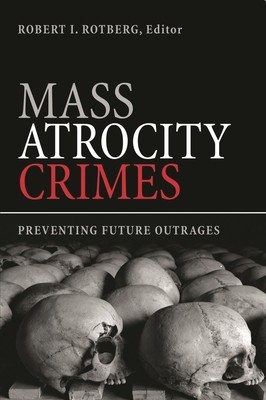
- We will send in 10–14 business days.
- Publisher: Brookings Inst. Press/World Peace Fdn.
- ISBN-10: 0815704712
- ISBN-13: 9780815704713
- Format: 15 x 22.6 x 1.8 cm, minkšti viršeliai
- Language: English
- SAVE -10% with code: EXTRA
Mass Atrocity Crimes (e-book) (used book) | bookbook.eu
Reviews
Description
"
What can be done to combat genocide, ethnic cleansing, and other crimes against humanity? Why aren't current measures more effective? Is there hope for the future? These and other pressing questions surrounding human security are addressed head-on in this provocative and all-too-timely book.
Millions of people, particularly in Africa, face daily the prospect of death at the hands of state or state-linked forces. Although officially both the United Nations and the African Union have adopted ""Responsibility to Protect"" (R2P) principles, atrocities continue. The tenets of R2P, recently cited in a UN Outcomes Document, make it clear that states have a primary responsibility to protect their citizens from genocide, war crimes, ethnic cleansing, and crimes against humanity. When states cannot--or will not--protect their citizens, however, the international community must step into the breach.
Why have efforts to stop horrific state-sanctioned crimes seen only limited success, despite widespread support of R2P? As this enlightening volume explains and illustrates, converting a norm into effective preventive measures remains difficult. The contributors examine the legal framework to inhibit war crimes, use of the emerging R2P norm, the role of the International Criminal Court, and new technologically sophisticated methods to gather early warnings of likely atrocity outbreaks. Together they show how mass atrocities may be anticipated, how they may be prevented, and when necessary, how they may be prosecuted.
Contributors include Claire Applegarth (Harvard Kennedy School), Andrew Block (Harvard Kennedy School), Frank Chalk (Montreal Institute for Genocide and Human Rights Studies, Concordia University), David M. Crane (Syracuse University College of Law), Richard J. Goldstone (Constitutional Court of South Africa; UN International Criminal Tribunals for the former Yugoslavia and Rwanda), Don Hubert (University of Ottawa; Global Center for the Responsibility to Protect, City University of New York), Sarah Kreps (Cornell University), Dan Kuwali (Malawi Defence Force), Jennifer Leaning (Harvard Francois Xavier Bagnoud Center for Health and Human Rights), Edward C. Luck (Columbia University; International Peace Institute), Sarah Sewall (Harvard Kennedy School)
"EXTRA 10 % discount with code: EXTRA
The promotion ends in 21d.12:36:14
The discount code is valid when purchasing from 10 €. Discounts do not stack.
- Publisher: Brookings Inst. Press/World Peace Fdn.
- ISBN-10: 0815704712
- ISBN-13: 9780815704713
- Format: 15 x 22.6 x 1.8 cm, minkšti viršeliai
- Language: English English
"
What can be done to combat genocide, ethnic cleansing, and other crimes against humanity? Why aren't current measures more effective? Is there hope for the future? These and other pressing questions surrounding human security are addressed head-on in this provocative and all-too-timely book.
Millions of people, particularly in Africa, face daily the prospect of death at the hands of state or state-linked forces. Although officially both the United Nations and the African Union have adopted ""Responsibility to Protect"" (R2P) principles, atrocities continue. The tenets of R2P, recently cited in a UN Outcomes Document, make it clear that states have a primary responsibility to protect their citizens from genocide, war crimes, ethnic cleansing, and crimes against humanity. When states cannot--or will not--protect their citizens, however, the international community must step into the breach.
Why have efforts to stop horrific state-sanctioned crimes seen only limited success, despite widespread support of R2P? As this enlightening volume explains and illustrates, converting a norm into effective preventive measures remains difficult. The contributors examine the legal framework to inhibit war crimes, use of the emerging R2P norm, the role of the International Criminal Court, and new technologically sophisticated methods to gather early warnings of likely atrocity outbreaks. Together they show how mass atrocities may be anticipated, how they may be prevented, and when necessary, how they may be prosecuted.
Contributors include Claire Applegarth (Harvard Kennedy School), Andrew Block (Harvard Kennedy School), Frank Chalk (Montreal Institute for Genocide and Human Rights Studies, Concordia University), David M. Crane (Syracuse University College of Law), Richard J. Goldstone (Constitutional Court of South Africa; UN International Criminal Tribunals for the former Yugoslavia and Rwanda), Don Hubert (University of Ottawa; Global Center for the Responsibility to Protect, City University of New York), Sarah Kreps (Cornell University), Dan Kuwali (Malawi Defence Force), Jennifer Leaning (Harvard Francois Xavier Bagnoud Center for Health and Human Rights), Edward C. Luck (Columbia University; International Peace Institute), Sarah Sewall (Harvard Kennedy School)
"

Reviews